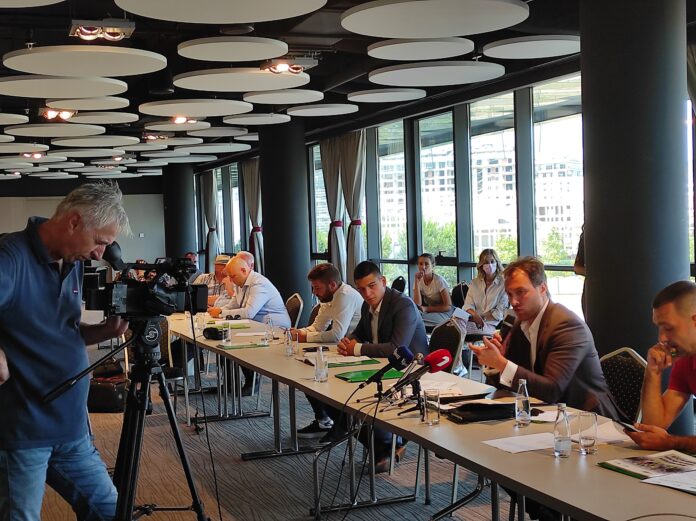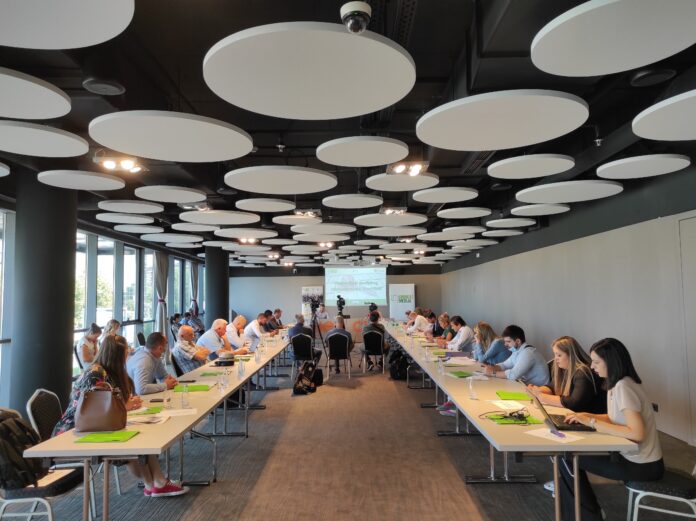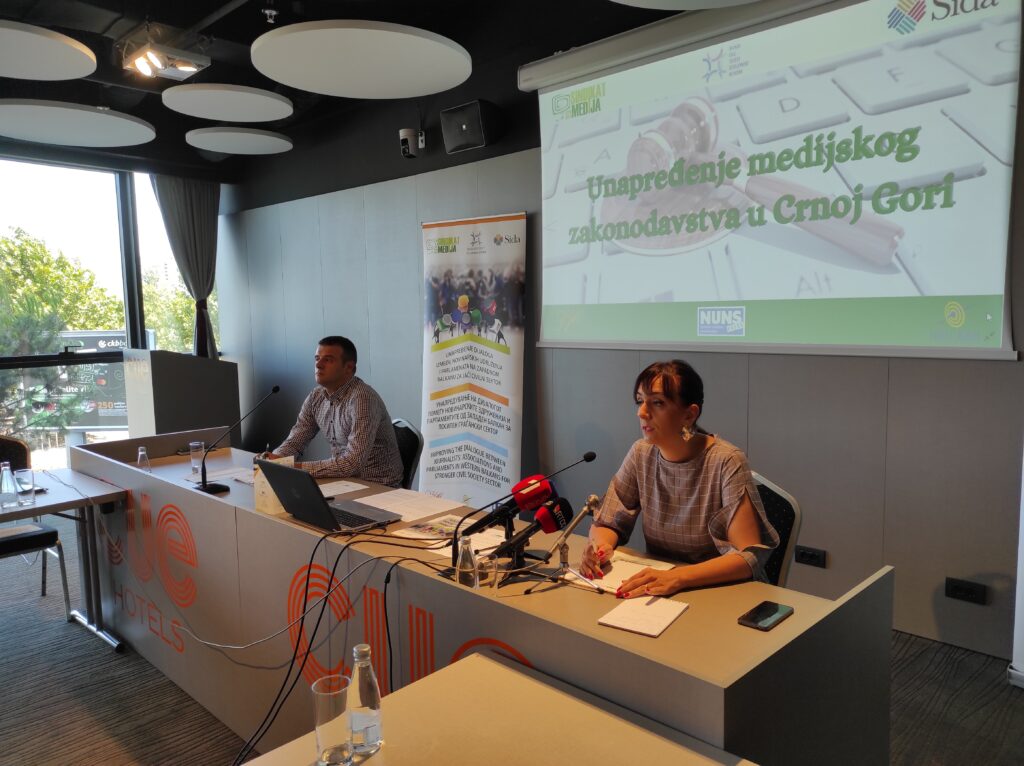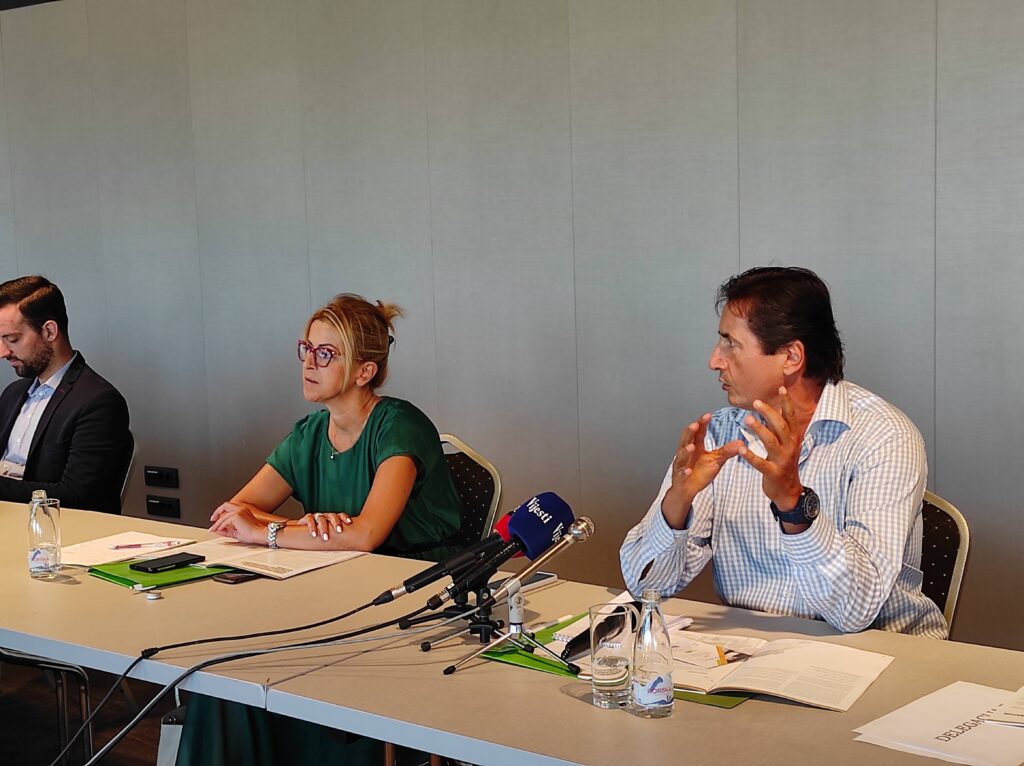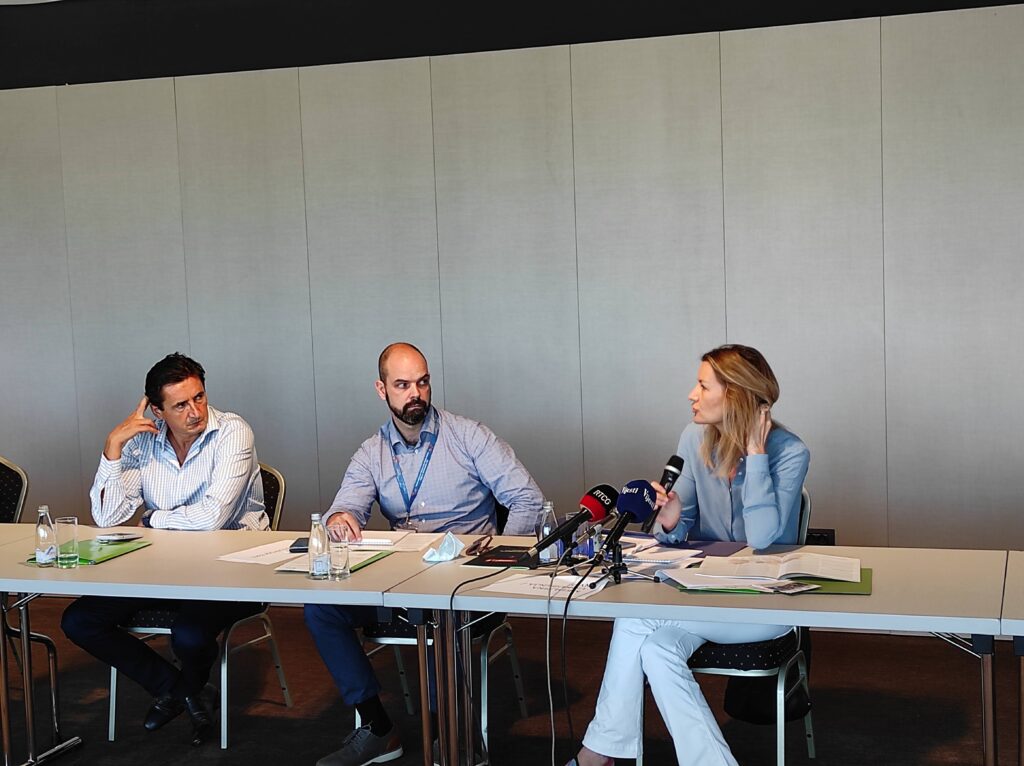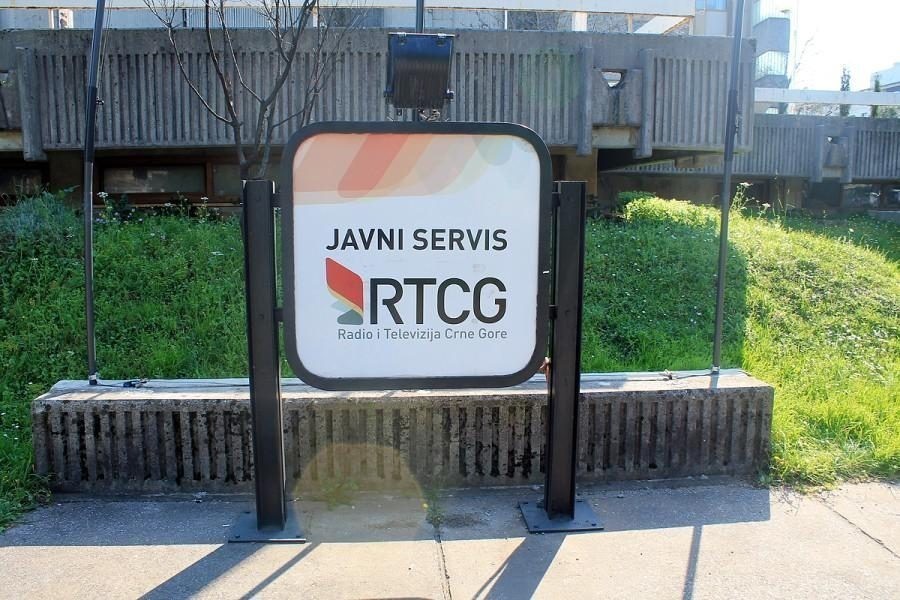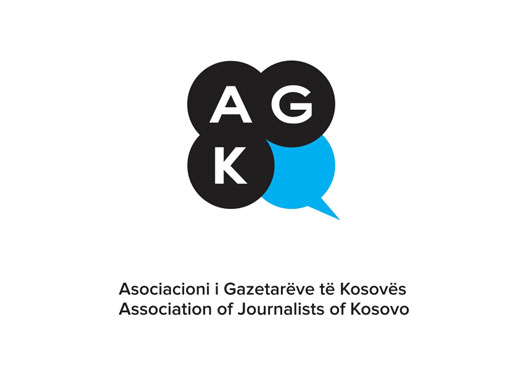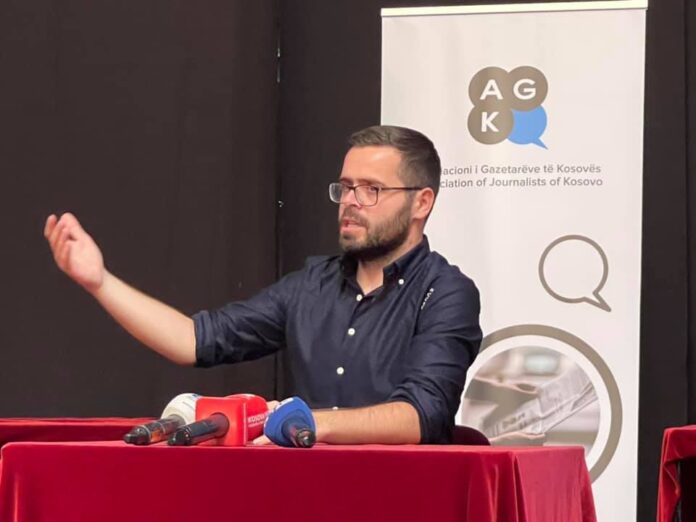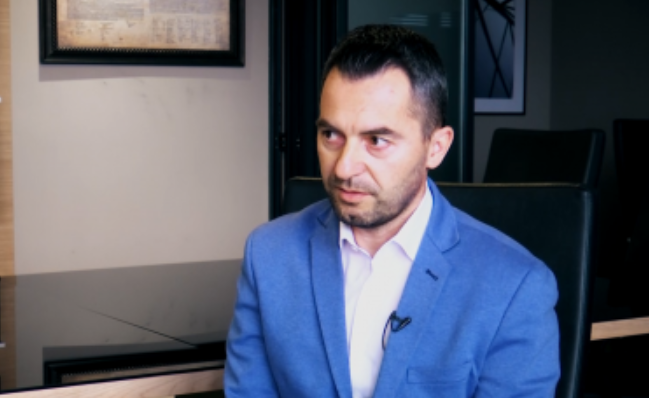PODGORICA, July 16th, 2021 – National Public Broadcaster Radio and Television of Montenegro (RTCG) has a special place in the media space of a small European country. It will soon mark the 60th anniversary of the founding of the Television and the 80th anniversary of the beginning of the broadcasting of Radio Montenegro. For a long time, RTCG was the only media in the area where, according to the latest census, about 620 thousand inhabitants live. Thus, his influence in the past was inviolable. It is clear that influence and objectivity, in the new era of media, very often have no points of contact. That is why today we have several laws that should make the work of the media more responsible and useful for society. The problem is complex because the political elites in power very skilfully take control of certain media, so the text of these laws has been changed several times.
Today, RTCG broadcasts four television (1st and 2nd program, Satellite program and Parliamentary channel) and two radio channels, and also publishes information through the electronic publication Portal RTCG. After the digitalization of technical systems during 2019, the potential of that medium has significantly increased. In addition to technology, there is great potential for workers, of whom, according to the latest information from the current management, there are 728.
Significance of Articles 9 and 16 of the Law on National Public Broadcaster RTCG
The importance of RTCG is evidenced by the fact that there is a Law on National Public Broadcaster that strictly regulates work of this media. Law was passed in 2008. It was amended in 2012 and 2016 and finally the last changes were in July 2020. The Law emphasizes the role of the Public Service as a factor of social cohesion and integration of all social elements. It should be a source of impartial information and commentary as well as a broadcaster of diverse content of high ethical standards. It is a place for a broad public debate on all topics of importance to society. The Law guarantees the independence of the National Public Broadcaster RTCG. These and other items of Article 9 of that Law speak about the essence of the role of the most important media in Montenegro.
Article 16 of the Law on National Public Broadcaster RTCG is perhaps the most important because it refers to the work of journalists. “Journalists employed in RTCG are independent in their work and act in the interest of the public. Journalists cannot be terminated, their salaries reduced, their status in the newsroom changed or their responsibility determined due to an attitude or opinion expressed in accordance with professional standards and program rules.” These legal items are a great achievement for a more carefree and objective work of the journalists of the Public Service. It is interesting that this level of protection of journalists is not provided by other laws related to the media, so that all those who deal with journalism in other media are at potentially high risk of losing their jobs due to a publicly expressed opinion (true and objective) which is not in line with the editorial policy of the media in which they are employed.
The institute of the Ombudsman was finally established
Amendments to the Law on National Public Broadcaster from 2020 envisage the introduction of an element of self-regulation through the institute of the Ombudsman. The obligations that the RTCG Council, through the appropriate Commission for Petitions and Complaints of Listeners and Viewers had in the previous period, are transferred to the Ombudsman who was elected by the new convocation of the Council less than a year after the adoption of amendments to the Law. The issue of self-regulation in the coming period will have to be further elaborated because the conclusions of the Ombudsman, as well as the previous Commission, are adopted by the Council, which has no mechanisms for determining responsibility for omissions. This is also the opinion of the Trade Union of Media of Montenegro in the latest analysis on media freedom and the safety of journalists.
Radio and Television of Montenegro are considered by political elites to be powerful media weapons. This primarily refers to the news program and special shows that deal with political and social issues. News within the Morning Program and “Dnevnik 2” on Television are the most watched informative shows. However, the ratings have dropped significantly in recent years because a good part of the public perceives the editorial policy of RTCG as close to the interests of the former ruling Democratic Party of Socialists. Biased reporting from major events, organized by opposing political blocs, irritated the public, especially during 2020, when relations in the already polarized Montenegrin society were further strained after the adoption of the Law on Religious Freedom in late December 2019. During the previous year, there was a record number of verbal and physical attacks on journalists as a result of the political environment created by the then ruling elite.
The Law on National Public Broadcaster, even in the period before the last amendments, guaranteed the freedom of opinion to the journalists of the Public Service in accordance with professional standards. However, paper is one thing and practice is quite another. Rare RTCG journalists, who dared to criticize certain biased programs of their media, and which essentially represented direct damage to RTCG in a professional sense, while irritating a good part of the public, faced a strong attack from the management. One author’s show has was removed from the program and the editor is ordered to leave the office. In “Dnevnik”, in prime time, it was broadcasted content whose goal was to discredit the personality of that journalist. No one from the management suffered the consequences due to illegal behavior and causing non-material damage to the employee of the Television of Montenegro. After the public announcement of the Trade Union of Media of Montenegro and previous criticism of the European Commission due to the intention of the RTCG leadership to initiate disciplinary proceedings against journalists, the management gave up on further repressive measures.
One of the bigger problems concerns the fact that RTCG is mostly financed from the state budget, ie from the money allocated by the citizens of Montenegro. For that reason, the employees of the National Public Broadcaster are responsible to all citizens, and not to special national or political groups. This is especially emphasized in the Law. By replacing the thesis, the previous government created the impression that it depends on it whether the payments for the needs of the program and the salaries on the account of RTCG will be regular. Also, the impression among journalists was that among them there are those who are more and those who are less important in the production process. The current management rewarded the journalists of the news program with a variable amount of salary. Journalists who dealt with the most important social and political topics were also the most awarded. However, high cash allowances were generally not the result of an objective and extraordinarily accomplished professional task. The well-paid management, with well-paid journalists, who are in slang called “first fists”, created the editorial policy of RTCG in accordance with the policy pursued by the previous government. This situation has lasted for at least two decades, and it has been especially pronounced in the previous 7-8 years. For this reason, a large part of the public believes that the National Public Broadcaster RTCG is unjustifiably called “Public Service”.
It should be noted that the salaries of all full-time workers are regular for years and are paid at the beginning of the month. Following the recent adoption of a new collective agreement, wages have been increased and workers whose salaries have been raised to a relatively acceptable level from month to month through uncertain cash benefits no longer have the stress of whether or not they will receive a “variable”. Special credit for that belongs to the Trade Union of RTCG employees, which, after many years of negotiations, managed to improve the material conditions of the employees.
Workers who have temporary contracts are at a disadvantage. Contracts usually last a month and are extended as needed. They are usually hardworking and dedicated workers who strive to do their job well. Management sees the need for their engagement, but very difficult decide to give them contracts for an indefinite period. Such a practice in many cases lasts for years. The situation is similar with part-time workers, of which there were many more in the previous period. In some cases, part-time engagement lasted for years. No health or pension insurance was paid to the freelancers at the time of such engagement. On the other hand, it is a public secret that many full-time workers do not meet the norm for receiving a full salary, and there are cases when some of them have not appeared at their workplace for years. Many open irrationally long sick days. The question of the justification of their further engagement is never raised because the Law strongly protects workers employed for an indefinite period of time. In cases where the management tried to fire a worker, for whatever reason, RTCG regularly lost disputes in the courts and had to pay high court costs and compensation to the workers which is obliged to return to work.
Greater transparency in the work of management is necessary
The Law on National Public Broadcaster stipulates the obligation to make available to the public all activities of RTCG that are of general social importance. If one word had to describe the way of employment, the distribution of funds for workers’ salaries and program projects, prices and elements of recent digitization, then that word would be non-transparency. Digitization has brought the need to create new jobs and close old ones, which have no significance in the new era of RTCG. A new, appropriate systematization, while respecting the professional standards and needs of the National Public Broadcaster, would solve the problem of overstaffing that has existed for decades. It has long been calculated by figures how many workers Public Service really needs. Management tried on several occasions to make a new systematization, but in a way that did not instill confidence that it would benefit all employees, but above all people close to the management. By objective analysis of the current situation and impartial systematization (which will not be likened to personalities), RTCG could get its rightful place on the Montenegrin media scene, to the satisfaction of workers who would have much better salaries, and thus much more motivation to raise quality in performing tasks. Consequently, the audience would be satisfied and would appreciate professional journalism.
The latest amendments to the Law on National Public Broadcaster set out the rules for the election of members of the Council. Confidence has been raised that members will be selected on the basis of expertise and that their engagement will lead to the raising of professional standards in RTCG. In the previous period, there was no high level of trust in the work of the Council, and the reason is, among other things, the choice made by the previous convocations regarding the personalities of the former general directors of RTCG. It turned out to be a regular practice for top management to create editorial policy in full accordance with the policy of the government structure. After the election of the new Council, which recently announced a competition for the new general director, the public expects that “Public Service” will justify its name in the future and respect precisely defined items of the Law on National Public Broadcaster.
Danijel Celecki
The article was created as part of the project “Improving Dialogue between Journalists’ Associations and Parliaments in the Western Balkans for a Stronger Civil Sector”, funded by the Swedish International Development Cooperation Agency (Sida) and the Balkan Civil Society Development Network (BCSDN).
The content of this article, as well as the information and views presented, do not represent the official views and opinions of Sida and BCSDN. Responsibility for the information and views expressed in this text is entirely copyrighted.




